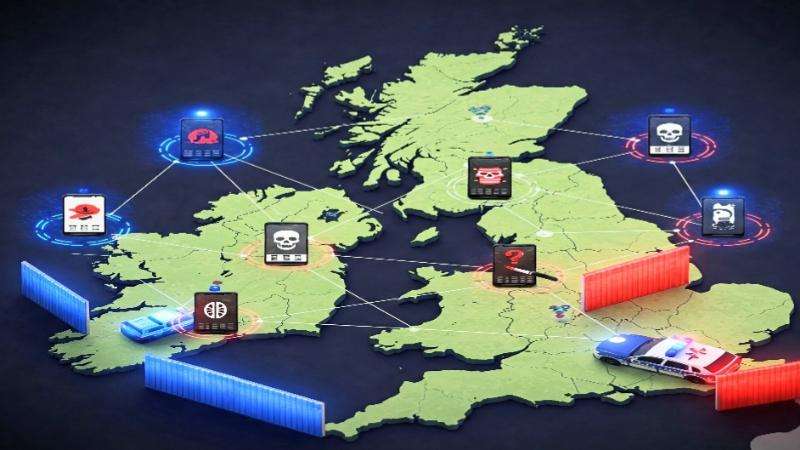A hidden epidemic is gripping the UK: sophisticated criminal networks are increasingly relying on mobile phones, particularly untraceable "burner" phones, to orchestrate a wide range of serious crimes, from burglary and human trafficking to drug dealing, sex crimes, and vehicle theft. While concrete, comprehensive statistics directly linking phone usage to each specific crime type remain elusive, the patterns of modern criminal activity, coupled with law enforcement intelligence, paint a concerning picture.
The anonymity offered by unregistered "button" phones, often acquired and discarded rapidly, provides a significant layer of insulation for criminal enterprises. These devices facilitate communication for coordinating illicit activities, arranging meetings, and managing the logistics of complex operations, all while making it incredibly difficult for authorities to trace their interactions and identify key players.
Evidence of Phone Use in UK Criminal Activity:While specific statistical breakdowns are not readily available, several indicators point towards the pervasive use of mobile phones in UK crime:
Organized Crime relies on communication: By their very nature, organized criminal activities necessitate effective and discreet communication. Mobile phones, with their ability to send encrypted messages and facilitate instant contact, are indispensable tools for these groups.
Drug Trafficking: As highlighted by the situation in France, drug dealing has increasingly moved towards delivery models coordinated via messaging services on mobile phones. This shift, driven by police crackdowns on physical drug sales locations, is likely mirrored in the UK.
Rise in Phone Theft: The government has acknowledged a significant surge in "snatch thefts" of mobile phones, driven by demand for second-hand smartphones. This indicates that stolen phones themselves become a commodity within criminal networks.
Exploitation of Mobile Networks: Recent actions by Ofcom to ban the leasing of "Global Titles" – special types of phone numbers – demonstrate the authorities' awareness of criminals exploiting mobile networks for illicit purposes, including fraud and other serious crimes.
Digital Evidence in Prosecutions: Law enforcement increasingly relies on mobile phone data – call logs, messages, location data – as crucial evidence in a wide range of criminal cases, indicating the prevalence of phone use in these activities.
UK Government and Police Aim for a Major Crackdown:Drawing lessons from France and adapting to the evolving tactics of criminals, the UK government and law enforcement agencies are intensifying their efforts to combat phone-related crime:
Banning "SIM Farms": In a significant move, the UK is set to ban "SIM farm" devices, which hold multiple SIM cards and are used to send mass scam texts and create fraudulent online accounts. This aims to disrupt a key tool used in various types of criminal activity, including fraud which often precedes or accompanies other offenses.
Enhanced Powers for Police: New legislation is granting police greater powers to search properties without a warrant for stolen phones if electronic tracking indicates their presence. This directly addresses the issue of phone theft and the subsequent use of these devices in further crimes.
Focus on Design and Disincentivization: The Home Secretary has convened summits with tech companies to collaborate on building stronger anti-theft security measures into phones, aiming to make them less valuable to criminals. This "designing out crime" approach could significantly reduce the incentive for phone theft.
Increased Investment in Policing: The government is doubling investment in neighbourhood policing to tackle theft, including phone theft, in local communities. This aims to increase police presence and responsiveness to these crimes.
Utilizing Digital Forensics and Intelligence: Police are increasingly employing advanced digital forensics techniques to extract data from seized mobile phones, even if attempts have been made to delete it. They are also using phone-tracking data and intelligence to identify and disrupt criminal networks.
Ofcom Action Against Network Exploitation: Ofcom is taking proactive steps to close loopholes in mobile networks that criminals exploit, such as banning the leasing of Global Titles, to prevent malicious use of the infrastructure.
Digital Dragnet: UK Unleashes Multi-Pronged Attack on Criminals Exploiting Mobile Phone Anarchy
The era of the anonymous "burner" phone providing a safe haven for criminal communication may be drawing to a close in the UK. Recognizing the pivotal role these devices play in facilitating a spectrum of illicit activities, from the shadows of human trafficking rings to the logistical hubs of drug cartels, the government and law enforcement are launching a concerted crackdown. Inspired by international examples like France's move to seize phones from drug users and dealers, the UK is implementing a range of measures targeting both the supply of these anonymous communication tools and the networks that rely on them.
The ban on "SIM farms" represents a significant step in disrupting large-scale fraudulent activities often linked to organized crime. Simultaneously, empowering police with the authority to enter premises where stolen phones are tracked aims to dismantle the immediate infrastructure supporting phone theft and its downstream criminal uses. Collaborative efforts with tech giants to enhance phone security at the design stage promise a longer-term solution by reducing the profitability of phone theft.
Coupled with increased investment in local policing and the sophisticated application of digital forensics, these initiatives signal a determined effort to dismantle the digital communication networks that underpin much of the serious crime plaguing the UK. While the challenge is significant, the multi-faceted approach adopted by the UK government and police indicates a strong commitment to reclaiming the digital space from criminal exploitation and fostering safer communities. The success of this "digital dragnet" will be crucial in curbing the rising tide of phone-facilitated crime and restoring a sense of security on the streets and in the digital realm.
_3.jpg)







.svg)
